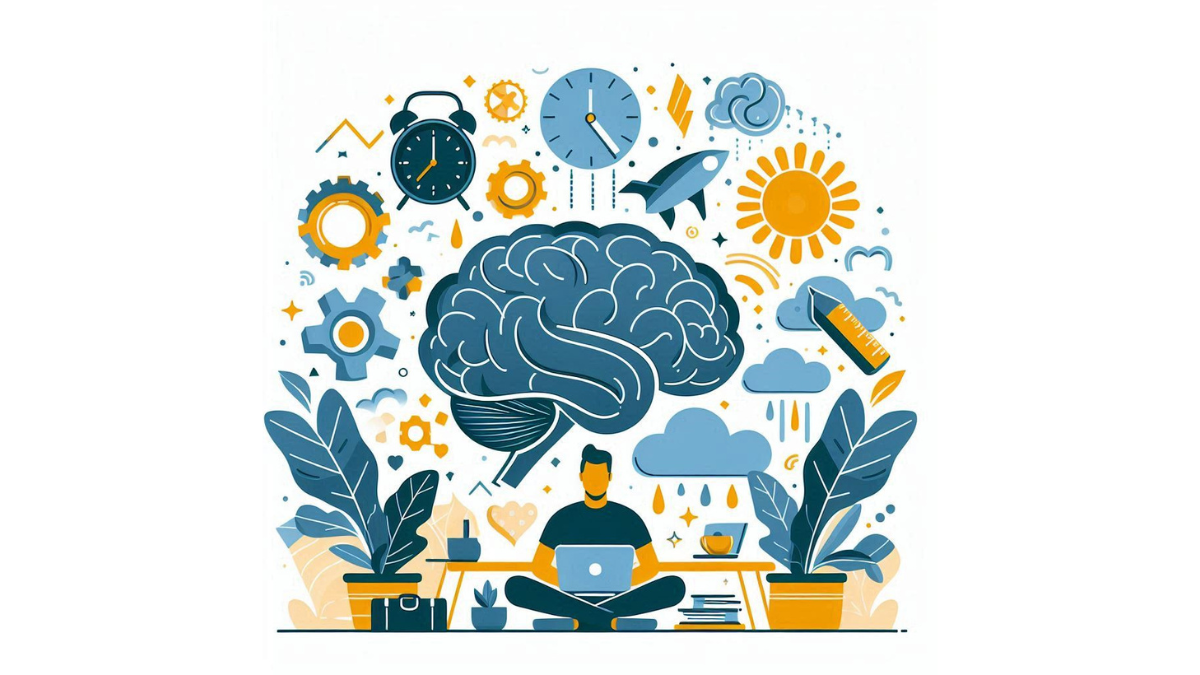Stress Management: Tips for a Healthy Mind

Stress Management: Tips for a Healthy Mind – Stress is a common experience in our fast-paced, modern world. Whether you’re battling deadlines at work, managing family commitments, or navigating personal challenges, it often feels like stress is an inevitable part of life. Understanding stress and its impact is crucial not only for managing daily pressures but also for maintaining overall health.
Why Stress Matters
Take a moment to consider your own life. Have you ever felt that tightness in your chest before an important presentation? Or perhaps the racing thoughts that keep you awake at night worrying about tomorrow? These feelings aren’t just inconvenient; they’re signs that stress is taking a toll on your body and mind. Research indicates that nearly 75% of adults experience moderate-to-high levels of stress, and this statistic highlights the importance of learning effective stress management techniques. Here are a few common stress triggers you might relate to:
- Work pressures: Tight deadlines, demanding bosses, and long hours can lead to overwhelming stress.
- Life changes: Major transitions like moving, starting a new job, or the end of a relationship can stir up anxiety.
- Financial worries: Budgeting, bills, and unexpected expenses often contribute to our stress levels.
- Health concerns: Illness or health issues can create significant emotional and mental strain.
In my own experience, I’ve found that recognizing these triggers has been a powerful first step in managing stress. For instance, when I realized that work-related stress was affecting my sleep, I began to prioritize self-care.
What to Expect in This Post
In this article, you’ll gain insight into:
- Understanding Stress: Learn what stress really is and the various types.
- Effects on Mental Health: Explore how stress impacts both psychological and behavioral aspects.
- Managing Stress: Discover effective strategies, including relaxation techniques like deep breathing and the importance of maintaining healthy lifestyle habits.
Together, we will unravel the intricacies of stress and empower you to take control of your well-being. Let’s dive in!
Understanding Stress
Moving from the introduction, it’s imperative to delve deeper into the concept of stress itself. Understanding what stress is and the various types can help you identify how it affects your life and well-being.
What is Stress?
At its core, stress is a natural response to challenges and pressures. It’s your body’s way of reacting to a demand or threat, activating the well-known “fight or flight” response. When you experience stress, your body releases hormones such as adrenaline and cortisol, triggering various physiological changes. You might notice:
- Increased heart rate: A telltale sign your body is preparing to respond.
- Muscle tension: You might feel tightness in your shoulders or jaw.
- Digestive issues: Stress can lead to discomfort or even changes in appetite.
In my own life, I noticed that even mundane issues—like figuring out what to make for dinner—could ignite a cascade of stress. Recognizing that these small pressures were impacting me helped guide me toward healthier coping mechanisms.
Types of Stress
Stress is not a one-size-fits-all experience, and it can be categorized into several types. Here are the most commonly recognized forms:
- Acute Stress: This is short-term stress that arises from specific events, such as an upcoming exam or a job interview. It’s typically resolved once the challenge has passed.
- Example: That feeling of anxiety before giving a speech; it usually disappears afterward.
- Chronic Stress: This type occurs from ongoing situations, such as an unhappy work environment or a difficult relationship. Unlike acute stress, chronic stress can be detrimental to your health, leading to serious problems like anxiety or depression.
- Example: A job that drains your energy day after day can lead to chronic stress.
- Eustress: Often considered “positive stress,” this is the type that motivates you and can lead to personal growth.
- Example: Starting a new job or planning a wedding can be stressful but ultimately rewarding.
Recognizing the type of stress you are experiencing is the first step toward effective stress management. By categorizing your stress, you can start to implement specific strategies that can help mitigate its impact on your life. Let’s explore how to manage stress effectively in the upcoming sections!
Effects of Stress on Mental Health
Having understood what stress is and the various types, it’s crucial to examine how stress affects our mental health. Stress can create significant psychological and behavioral changes that may affect our daily lives in profound ways.
Psychological Impact
The psychological impact of stress is often the most evident. You might find yourself struggling with overwhelming emotions or facing persistent mental fatigue. Here are some common psychological effects of stress:
- Anxiety: Ongoing stress can lead to feelings of worry that are challenging to shake. You may feel on edge or fearful of what’s to come.
- Depression: Chronic stress can sap your motivation and create feelings of hopelessness. This was true for me during a particularly stressful period at work, where I found it difficult to find joy in things I once loved.
- Cognitive Disturbance: Stress can also cloud your mind, affecting memory and decision-making abilities. You might find it hard to concentrate or remember simple tasks.
Understanding these psychological impacts can provide a roadmap for recognition and intervention—so if you find yourself experiencing these feelings, know you are not alone.
Behavioral Impact
In addition to psychological shifts, stress often manifests in behavioral changes that can set off a cycle of negative outcomes. Here are a few behavioral impacts to consider:
- Changes in Eating Habits: Some individuals may indulge in emotional eating or withdraw from food altogether. You might turn to comfort foods or experience a loss of appetite; I know I’ve gone through phases filled with pizza-fueled late nights, followed by intense regret.
- Withdrawal from Social Engagements: Stress can cause you to isolate yourself, making it harder to connect with family and friends. This isolation can perpetuate the feelings of anxiety and depression.
- Increased Substance Use: Some may cope with stress by turning to alcohol, cigarettes, or other substances—leading to further health complications.
Understanding these behavioral effects is vital; they often feed back into the psychological impacts, creating a challenging cycle. As we move forward, let’s explore practical strategies for managing the stress that’s affecting our mental health.
Importance of Stress Management
Having explored the profound effects of stress on both mental health and behavior, it’s essential to emphasize the importance of effective stress management. Learning to manage stress isn’t just about alleviating anxiety; it’s about enriching your entire quality of life.
Benefits of Managing Stress
When you actively manage stress, the benefits can be transformative. Here are some key advantages you might experience:
- Improved Mental Clarity: Managing stress often leads to a clearer mind, allowing for better decision-making and focus on important tasks. You may find that anxiety-induced fog lifts, giving way to productive thinking.
- Enhanced Mood: Stress management techniques, such as mindfulness or exercise, can lead to reduced levels of anxiety and a more positive outlook on life. Personally, after starting a morning meditation routine, I noticed days were less filled with racing thoughts and more with calm clarity.
- Stronger Relationships: By dealing with stress effectively, you’re more likely to engage positively with those around you. When you’re calmer, communication improves, and conflicts reduce.
Investing in stress management can set you on a path of greater resilience and fulfillment.
Connection to Overall Well-being
The impact of effective stress management extends far beyond the mind; it’s intricately linked to overall physical and emotional well-being. Here are a few connections to consider:
- Physical Health: Chronic stress can lead to serious health issues like hypertension or heart disease. By managing stress, you can decrease these risks significantly, ultimately leading to a healthier body.
- Life Satisfaction: Managing stress can lead to a more balanced and joyous life. With less anxiety weighing you down, you have the space to enjoy activities and relationships that bring joy and purpose.
- Resilience Building: Developing effective coping strategies equips you to manage future stressors more effectively. The more you practice, the stronger and more adaptable you become.
In my own experience, having stress management strategies in my back pocket, like deep breathing or talking it out with friends, has shown me that stress doesn’t have to control my life. It’s about creating a toolbox of techniques to thrive despite challenges. As we continue, let’s discover practical tips and techniques to manage stress effectively!
Tips for Managing Stress
With a clearer understanding of the importance of stress management and its benefits, let’s dig into some practical tips that can help alleviate stress in your daily life. Two effective strategies include exercise and physical activity, as well as mindfulness and meditation.
Exercise and Physical Activity
One of the most effective stress-relievers is exercise. Physical activity not only boosts endorphins—those feel-good hormones—but also serves as a productive outlet for pent-up energy and anxiety. Here are some ways exercise can help manage stress:
- Regular Workouts: Aim for at least 30 minutes of moderate exercise most days of the week. Whether it’s a brisk walk, jog, or yoga session, getting your body moving can significantly reduce stress levels. Personally, I’ve found that even a 30-minute run can transform a stressful day into a more manageable one.
- Group Activities: Engaging in group sports or community fitness classes can not only provide a workout but also foster social connections, which can buffer against stress.
- Movement Breaks: Incorporate short exercise breaks into your day to refresh your mind. For example, stand up, stretch, or do a few yoga poses every hour while working.
Mindfulness and Meditation
In addition to exercise, practicing mindfulness and meditation can be incredibly effective in managing stress. These mindfulness techniques help ground you in the present moment and create mental space for relaxation. Here’s how:
- Daily Meditation: Just a few minutes of meditation each day can lead to increased awareness and a sense of calm. You might find it helpful to use apps like Headspace or Calm to guide your sessions. During my personal journey, incorporating daily meditation has been pivotal; I often find clarity and peace even amidst chaos.
- Mindful Breathing: Engage in deep breathing exercises. Inhale deeply through your nose, hold for a few seconds, then exhale slowly through your mouth. This simple act can trigger the body’s relaxation response and can be done anywhere, making it a handy stress management tool.
- Mindful Observation: Spend a few minutes each day observing your surroundings—the colors, sounds, and sensations. This practice can bring your awareness back to the present and away from stressors.
Combining physical activity with mindfulness practices creates a powerful strategy for managing stress. By integrating these methods into your life, you’ll cultivate resilience and improve your overall well-being. Let’s explore more holistic approaches to maintaining a stress-free lifestyle in the next section!
Healthy Lifestyle Habits
As we continue our journey toward effective stress management, it’s essential to emphasize the role of healthy lifestyle habits. Consistent, nourishing habits significantly contribute to your overall well-being and help combat stress. Let’s focus on two critical areas: a balanced diet and adequate sleep.
Balanced Diet
Eating a balanced diet is vital not only for physical health but also for managing stress. The food you consume influences your mood, energy levels, and resilience to stress. Consider these tips for maintaining a healthy diet:
- Incorporate Whole Foods: Aim to fill your plate with whole, unprocessed foods like fruits, vegetables, lean proteins, and whole grains. These foods provide essential nutrients that help your body cope better with stress.
- Hydration Matters: Stay well-hydrated. Dehydration can exacerbate feelings of fatigue and anxiety. I’ve noticed that on days when I forget to drink enough water, my stress levels tend to spike.
- Limit Sugar and Caffeine: While it might be tempting to reach for sugary snacks or caffeinated drinks during stressful times, these can lead to crashes that exacerbate anxiety. Instead, opt for healthy snacks like nuts or yogurt.
- Mindful Eating: Pay attention to what you’re eating. Eating mindfully—savoring each bite without distractions—can enhance your enjoyment of food and help reduce stress.
Adequate Sleep
Sleep is another fundamental pillar of well-being that is often overlooked in the hustle and bustle of daily life. Lack of sleep can irritate and amplify stress, while a good night’s rest can refresh your mind and body. Here are some tips for ensuring adequate sleep:
- Establish a Routine: Go to bed and wake up at the same time every day, even on weekends. This helps regulate your body’s internal clock. Personally, I’ve found that maintaining a consistent sleep schedule improves my mood and sharpens my focus during the day.
- Create a Relaxing Bedtime Ritual: Engage in calming activities before bed, such as reading, taking a warm bath, or practicing meditation. Dimming the lights and limiting screen time can also signal to your body that it’s time to wind down.
- Comfortable Sleep Environment: Ensure your bedroom is conducive to restful sleep. A comfortable mattress, cool temperature, and minimal noise are essential for quality rest.
Incorporating these healthy lifestyle habits into your routine can serve as a robust foundation for stress management. By focusing on nutrition and sleep, you will enhance not just your overall health, but also your ability to handle life’s challenges effectively. Next, let’s delve into the importance of building supportive relationships in managing stress!
Building Supportive Relationships
As we explore the ways to manage stress effectively, one of the most powerful tools at your disposal is building supportive relationships. Connecting with others can significantly alleviate stress and improve your mental well-being. This segment focuses on the importance of social connections and seeking professional help when needed.
Social Connections
Having strong social connections plays a crucial role in managing stress effectively. When life gets overwhelming, having a network of friends and family can offer emotional support and practical help. Here’s how you can strengthen your social connections:
- Reach Out to Loved Ones: Make it a habit to check in with friends and family regularly. Whether it’s a heartfelt text, a phone call, or meeting up for coffee, these connections can offer stress relief and emotional support. I’ve found that sharing a laugh or discussing my day with a close friend can instantly lift my spirits.
- Join Groups or Clubs: Engaging in activities you enjoy can lead to new friendships and foster a sense of community. Whether it’s a hobby group, a fitness class, or a volunteer organization, building new connections can reduce feelings of isolation.
- Be Open About Your Feelings: Don’t hesitate to express how you’re feeling. Opening up to trusted friends or family members can create deeper bonds and help alleviate stress. You might be surprised by how many people relate to what you’re going through.
Seeking Professional Help
While social connections are vital, sometimes the stress you’re experiencing may require more specialized support. This is where seeking professional help comes into play. Here are some points to consider:
- Therapists and Counselors: Engaging with a mental health professional can offer you the tools and strategies needed to cope with stress effectively. It provides a safe space to explore your feelings without judgment. I remember my first therapy session gave me invaluable insight and coping techniques that I still use today.
- Support Groups: Sometimes, connecting with others facing similar challenges can be incredibly comforting. Support groups offer a platform for shared experiences, allowing you to gain perspective as well as strategies.
- Employee Assistance Programs (EAP): Many workplaces offer EAPs that provide free counseling services. Taking advantage of these resources can be a helpful way to access professional support.
In summary, building supportive relationships—both with friends and family as well as mental health professionals—can significantly enhance your ability to manage stress. As we proceed, let’s explore effective time management strategies that can further empower you in your daily life!
Time Management Strategies
As we shift our focus to managing stress through effective time management strategies, it’s essential to look at two key components: prioritizing tasks and setting boundaries. When you learn to manage your time effectively, you not only reduce stress but also create a sense of accomplishment and control.
Prioritizing Tasks
Prioritizing tasks is about recognizing what truly matters and allocating your time accordingly. Here are some practical steps to help you prioritize:
- The Eisenhower Matrix: This framework helps differentiate between urgent and important tasks, allowing you to categorize your responsibilities. Divide your tasks into four quadrants:
- Urgent and Important: Tasks you need to handle immediately.
- Important but Not Urgent: Tasks you can schedule for later.
- Urgent but Not Important: Tasks that can be delegated to others.
- Not Urgent and Not Important: Tasks that can be eliminated or minimized.
Not too long ago, I implemented this matrix to manage my workload better. It has been a game-changer! I found that many tasks I thought were urgent weren’t truly significant, freeing up time for what really matters.
- Make Daily To-Do Lists: List your tasks the night before and rank them based on priority. Focusing on just a few key tasks each day can help you feel accomplished without feeling overwhelmed.
Setting Boundaries
Setting boundaries is equally crucial for effective time management. You can’t pour from an empty cup, so it’s essential to protect your time. Here are some essential strategies to help you establish boundaries:
- Learn to Say No: It’s okay not to take on every request that comes your way. Politely declining commitments that don’t align with your priorities can preserve your energy. From my experience, learning to say no has often led to greater focus on what truly matters to me.
- Designate Work Hours: If you work from home, set specific working hours and stick to them. Communicate these hours with others to minimize interruptions during your focused work time.
- Create a Wind-down Routine: Establish a routine to signal the end of your workday. This can include turning off work notifications, cleaning up your workspace, or engaging in a relaxing activity. It can help you separate work life from personal time effectively.
By implementing these time management strategies, you can create space in your day to breathe, relax, and enjoy your life without the overwhelming pressure of unmet deadlines. In the next section, we’ll explore relaxation techniques that can further reduce stress and promote overall well-being!
Relaxation Techniques
Having explored effective time management strategies, it’s essential to incorporate relaxation techniques that can help mitigate stress in your daily life. Two highly effective methods are deep breathing and progressive muscle relaxation. These techniques can quickly foster a sense of calm and help you regain control, especially in moments of high stress.
Deep Breathing
Deep breathing is a simple yet powerful way to promote relaxation and reduce stress. It engages your diaphragm, allowing for full oxygen exchange, which can calm your mind and body. Here’s how to do it effectively:
- Find a Comfortable Position: Sit or lie down somewhere quiet, ensuring you are comfortable. Close your eyes if that helps you focus.
- Inhale Deeply: Breathe in slowly through your nose for a count of four. Allow your abdomen to expand fully, filling your lungs completely.
- Hold Your Breath: Pause for a moment, holding your breath for a count of four.
- Exhale Slowly: Breathe out gently through your mouth for a count of four, letting go of all tension.
- Repeat: Continue this cycle for a few minutes, focusing solely on your breath.
I often use deep breathing techniques before stressful meetings or presentations. Just a few minutes of deep, mindful breathing help me feel more centered and ready to tackle whatever comes my way.
Progressive Muscle Relaxation
Progressive Muscle Relaxation (PMR) is another effective technique that involves tensing and then relaxing different muscle groups in your body. This method not only reduces physical tension but also promotes mental tranquility:
- Find a Quiet Space: Like with deep breathing, start in a comfortable, quiet environment.
- Tense and Relax: Begin with your feet. Tense the muscles in your feet as tightly as you can for a count of five, then relax completely. Notice the difference between tension and relaxation.
- Move Up the Body: Gradually work your way up through each muscle group—calves, thighs, abdomen, arms, shoulders, and face—tensing for five seconds and then relaxing.
- Focus on Sensations: As you relax each muscle group, pay attention to how your body feels, releasing any stress or tightness.
In my experience, PMR is especially helpful during busy or overwhelming days. By taking a few moments to pause and engage my entire body in relaxation, I find a renewed sense of calm and focus. Incorporating these relaxation techniques into your daily routine can significantly enhance your stress management arsenal. Together, they can help you cultivate a peaceful mindset, preparing you to face life’s challenges with resilience and poise. As we wrap up, let’s discuss how to create a personalized stress management plan that suits your unique needs!
Creating a Stress Management Plan
As we conclude our discussion on various stress management techniques, it’s vital to consolidate your efforts by creating a personalized stress management plan. This plan should encompass identifying your stress triggers and developing coping mechanisms to address them effectively.
Identifying Triggers
The first step in crafting a solid stress management plan is pinpointing what specifically triggers your stress. Understanding these triggers gives you insight into why you may feel overwhelmed and what you can do to mitigate those feelings. Here are some steps to help you identify your triggers:
- Keep a Stress Journal: For at least a week, document your daily experiences, noting when you feel stressed and what the specific situation was. Reflection has helped me tremendously; I found patterns in my stress responses I never noticed before.
- Look for Patterns: After keeping your journal, review it to see if certain situations, people, or events consistently cause stress. For instance, you might realize that meetings tend to leave you anxious or that you feel strained during family gatherings.
- Consider Your Emotions: Pay attention to your emotional responses. Are there recurring feelings such as frustration, anxiety, or sadness connected to specific triggers? Recognizing these can be eye-opening in understanding where your stressors lie.
Developing Coping Mechanisms
Once you’ve identified your stress triggers, the next step is developing effective coping mechanisms. Here are some strategies you can incorporate into your plan:
- Create a Toolbox of Strategies: Based on your insights, list relaxation techniques, physical activities, or hobbies that you can turn to when stressors arise. For instance, if deadlines at work trigger your stress, you might include deep breathing exercises or planning breaks into your schedule.
- Establish a Support Network: Engage family, friends, or professional counselors who you can lean on during stressful times. I have often found solace in talking things out with a friend, which provides not only support but also new perspectives.
- Practice Self-Compassion: Remember to be kind to yourself in managing stress. Acknowledge that it’s okay to feel overwhelmed; self-compassion can encourage resilience.
Creating a tailored stress management plan can empower you to recognize and address stress more effectively. By identifying triggers and developing solid coping mechanisms, you’ll be better equipped to handle life’s challenges with grace and calm. With these tools in your arsenal, you can actively cultivate a stress-free lifestyle and enhance your overall well-being. Here’s to your journey toward a more balanced and fulfilling life!
You might also find this article helpful Happy Healthy and Whole : The Power of Positive Habits






2 Comments